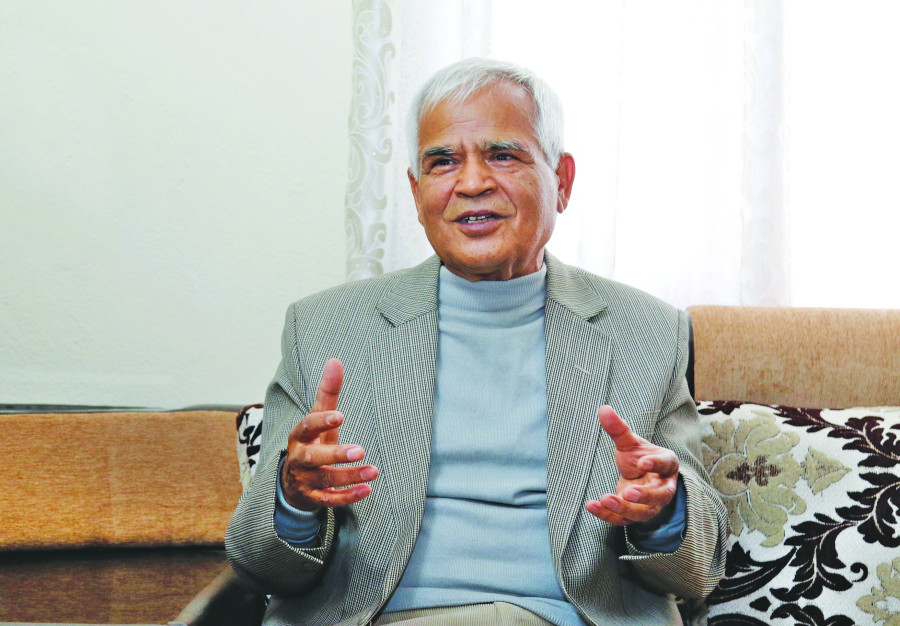Interviews
Old parties failed to understand the new generation
The political template of Congress and Communists are decades old. Closed camps and cadre training don't work so well in the age of social media.
Thira Lal Bhusal & Nishan Khatiwada
As vote-counting for the 2022 federal and provincial elections ends, a tentative picture of the parties’ strengths and weaknesses is becoming clear. The Post’s Thira Lal Bhusal and Nishan Khatiwada talked to political analyst Krishna Khanal about the recently-concluded elections, their indications, and future power politics.
How do you analyse the emerging election results?
May’s local polls had already hinted at a certain level of restlessness. Voters can change sides at any time, was the takeaway message. Voters frustrated by the lacklustre performance of previous mayors, elected a new mayor unlinked with politics in Kathmandu metropolitan city. Yet, the political parties did not learn their lessons.
Thus, the result of the November polls is no surprise, at least for me. It would have been unexpected had the new parties and independent candidates swept the elections. Rastriya Swatantra Party (RSP) emerging as a challenger to the big parties hints that voters crave for a change. Though the dominant parties are still the Congress, UML, and Maoist Centre, the public disenchantment has been expressed in the 2022 major polls.
The public dissatisfaction was also reflected in Madhesh. The CK Raut-led Janamat Party caught the public imagination and has emerged as a regional force. Meanwhile, many of the key Madheshi leaders did not fare well.
Many think the Rastriya Swatantra Party lacks ideological clarity. What do you say?
I don’t think ideologies matter much in contemporary politics. Parties like the RSP are still in their infancy. What matters is now they turn promises into actions.
They won because of their anti-corruption agenda and promise to deliver. Now, they should build the bases for delivery—with clear agendas for development and good governance. They should think of whether their presence in government (if they join it) can bring about policy-level changes.
Good governance is easier said than done. The emerging parties should have concrete ideas. Agenda-wise preparation is necessary to shape law-making in a way that opens the door for good governance. Also, the emerging parties should avert any disputes that may arise on the issue of joining the government. Such disputes can lead to splits, as the history of our parties suggests.
Would you back the statement that the various pre-poll alliances failed?
It has now been shown that vote-convergence is not easy in an open system like ours where the election franchise is deemed a sovereign right of the public. It is not necessary that even conventional voters will agree when top leaders ask them to cast votes for other parties. People were frustrated when they were asked to do so. And political parties, on the other hand, shared seats based on calculations without any proper research.
Which, in your view, is better: pre-poll or post-poll alliance?
Pre-poll alliance is better in the sense that there exists a commitment to the voters—partners claim to be proceeding jointly. The votes in the constituencies Congress won in FPTP also consist of Maoist Centre votes. Votes have been more or less shared between the alliance partners. So, in a way, it makes alliance partners accountable to voters and to each other.
On the other hand, opportunism and the lust for power characterise post-poll alliance. As such, the pre-poll alliances have more potential to sustain. This is only a theory but in India some alliances have sustained for decades.
This time, the alliances are said to be unnatural as they incorporate partners with opposite ideologies.
Our voters are indoctrinated with various ideologies. But our political parties have been sharing power for a long time, despite their divergent ideologies.
Ideologies don’t exist in a pure sense. Alliances can be forged over agendas such as governance and development. Unnatural alliances are nothing new. However, such alliances should be workable. The two options now are either a government under the Congress or UML leadership. What matters is the decisions that will be made in the parliament. For that, having a workable alliance is a good option.
The forces which lobbied for change after the 2006 movement seem to be on the wane. How do you see this change?
Two forces emerged back then: The Maoists and the Madheshis. Maoists failed to develop into a united and well-organised political party. Maoist leader Prachanda has since 2006 remained busy in power politics while ignoring the ground and organisational strength. The Maoist Centre should realise that power comes from a strong base.
Likewise, Madhesh-based leaders such as Upendra Yadav who are actors in national power politics have been ignoring their bases. As such, the foundation of the Madhes-based parties is also weakening.
Maoist Centre has been the kingmaker in Nepali politics since 2013. But it did not fare well in elections this time. Which forces will play this role this time?
With the emergence of new forces in the Parliament, the power equation will naturally change. The Maoist Centre’s inability to become the sole kingmaker has provided space for the Rastriya Swatantra Party as a potential kingmaker. It would have been otherwise had the Congress been able to garner a majority with the backing of the Maoist Centre.
Do you see any possibility of a communist alliance?
No. I don’t see the possibility of a durable communist alliance. The Maoist Centre and the Unified Socialist have split away from a solid communist force. They can play the alliance card to trick people. Or foreign powers can try to influence Nepali politics with this card. But I don’t see space for an alignment on the basis of ideologies such as communism. Working alliance is the only option now.
Do you foresee more political instability as a result of more parties competing for power?
Yes. There can be a difficulty if there is no point of convergence between the RSP and Maoist Centre. Also, in such a case, there is a chance of government formation with the help of smaller forces. The main problem is that our alliances lack honesty, and dishonest alliances can lead to instability.
How do you evaluate the performance of Madheshi parties?
Madheshi people still want more regional forces to emerge. But the political actors from Madhesh are dependent on foreign forces and big parties.
It is not wrong of regional forces to seek power even at the federal level but they should have a long-term vision on how to use that power. The leaders from Madhesh have time and again come to power. But to what extent they were successful in establishing the regional agenda is an unanswered question.
The Madhesh agenda is permanent, but the actors can change. Previous actors no longer hold sway—old Madhesh-based parties did not fare well and their key leaders either lost or struggled for victory.
What challenges do you foresee for the big parties?
The emergence of new forces signifies that the public will look for alternatives if the parties fail them repeatedly. They want a better-functioning Parliament.
The main challenge for the old parties is to change their modus operandi which can no longer be based on conventional agendas. The political template of Congress and Communists are decades old. A new generation of voters has emerged and we are in the digital age. Closed camps and cadre training don’t work so well in the age of social media.
The big parties have challenges galore as the new generation does not heed party leaderships’ guidance on how they should vote. They seek rational reasons. The parties have failed to understand how the new generation thinks.
What are the chances of the old leaders passing over the leadership baton to young ones?
The current alliances have morphed into alliances only between their top leaders. As the top leaders are not positive about leadership transfer, I see less possibility for new faces in power politics.
The new generation should speak up in favour of leadership transfer. I personally find Gagan Thapa’s claim to prime minister timely. And, I think the time is ripe for top leaders of big parties to step down. Parties are losing public trust, as was reflected in the voting. If they step down, the leadership change would be easier.
Given the old leaders’ reluctance to step down, intra-party rebellions seem inevitable, especially in the Nepali Congress.




 18.12°C Kathmandu
18.12°C Kathmandu





.jpg&w=200&height=120)







